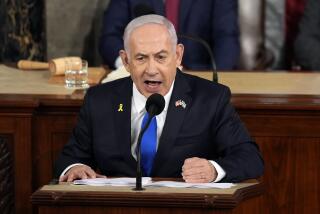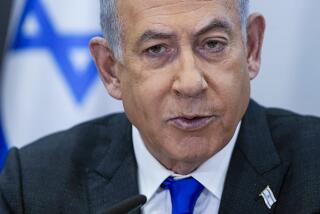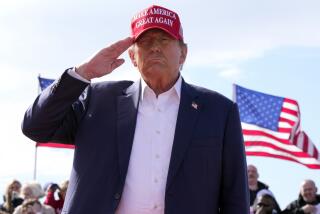Bush to Make His Iraq Case in TV Speech
BOSTON — As Congress prepares to grant him authority for a potential attack on Iraq, President Bush plans to address the nation Monday evening in an effort to shore up public support for a campaign against Iraqi President Saddam Hussein.
The White House’s announcement of the speech, to be delivered in Cincinnati, amounted to a tacit acknowledgment that Bush has yet to win the unqualified support of the American people in his quest for a “regime change” in Baghdad.
“The country will benefit from an opportunity to hear the president reflect on the reasons that Saddam Hussein is such a clear threat to the United States,” White House Press Secretary Ari Fleischer said.
But Fleischer indicated that Bush would neither announce new policy nor offer fresh evidence in making his case. Rather, he intends to repackage his previous descriptions of the danger posed by Hussein, a man Bush repeatedly has warned may use weapons of mass destruction against the United States.
In another mixed signal about the importance the White House attaches to the speech, Fleischer said the commercial networks would not be asked to televise it live. It could be shown by the major cable news networks.
Congress is all but certain to approve a resolution next week granting the president broad leeway to launch an attack on Iraq, but polls have found that much of the public is uneasy about military action that does not enjoy broad international support. As a result, analysts said it is not surprising that Bush would turn his attention to the court of public opinion.
“The president and the Congress are far, way far, out in front of the public on this,” said Larry J. Sabato, a University of Virginia political analyst.
Sabato added: “People wonder: Why are we doing this? Why now? Why this great urgency? Is it just a grudge match? People are very troubled by it. They don’t want to be unpatriotic. After 9/11, they do want to rally around the flag and the president. But they want to know why. What does this have to do with Al Qaeda, if anything?”
A recent USA Today/CNN/Gallup Poll found that, with congressional approval, 69% of Americans support sending troops to Iraq to oust Hussein; that percentage rose to 79% if the action had U.N. backing. But only 59% approved of a unilateral U.S. invasion of Iraq.
A Washington Post-ABC News Poll found more division, with 47% opposing and 46% favoring an attack that did not include U.S. allies.
Charles Cook, a Washington-based political analyst, said he is not surprised by the White House attempt to keep Iraq on the front burner, especially with just a month left before the midterm elections.
“If the spotlight is on the economy, Democrats do real well. And if it’s on Iraq, then the president and Republicans do well,” Cook said.
At the same time, he added, emerging polls may be foreshadowing a drop in Bush’s job-approval ratings because public concern over the economy appears to be soaring.
“Whoever controls the spotlight will control this election,” Cook predicted.
Bush traveled to Boston on Friday to address a Republican fund-raiser and campaign for Mitt Romney, the GOP gubernatorial candidate in Massachusetts. He provided a possible preview of his Monday speech, as he challenged Hussein to honor his pledges to allow unfettered U.N. inspections and to give up any weapons of mass destruction.
Bush also called Hussein “a cold-blooded killer”--a phrase that he had reserved for members of the Al Qaeda terrorist network.
“This is a man who I believe strongly thinks he can use terrorist networks to foster his own ambitions,” Bush said. “This is a man who, when [weapon inspectors] went into Iraq the first time, it was discovered that he was a short period away from developing a nuclear weapon.”
Bush added:
“He said he wouldn’t have weapons of mass destruction, and that’s what those of us who love peace expect.”
But if Hussein does not comply, and if the United Nations does not act, Bush said: “The United States will lead a coalition to disarm this man before he harms America and our friends.”
Despite his tough words, the president’s remarks continued to suggest some softening of his stance toward Hussein.
For several days now, Bush made no mention of ousting the Iraqi president, while emphasizing the role the U.N. and a coalition of countries would play in the push to disarm Iraq.
The change in tone seems targeted at gaining wider support for the resolution pending in Congress.
While congressional support for authorizing military action is not in doubt, the more lopsided the vote, the more bargaining power Bush might gain in the U.N.
The president is scheduled to deliver his speech at 5 p.m. PDT before an audience of about 500 people assembled by Cincinnati’s World Affairs Council, the Chamber of Commerce and the United Way.
More to Read
Sign up for Essential California
The most important California stories and recommendations in your inbox every morning.
You may occasionally receive promotional content from the Los Angeles Times.










